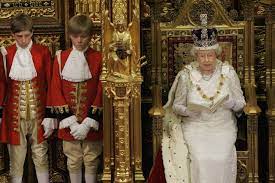In a tradition-rich ceremony in Parliament, Britain’s Conservative government made ambitious promises to slash crime, enhance health care, and revitalize the country’s pandemic-ravaged economy — but without Queen Elizabeth II, who was absent for the first time in six decades.
The 96-year-old monarch declined to read the Queen’s Speech at the ceremonial opening of Parliament due to “episodic mobility problems,” according to Buckingham Palace. Prince Charles, her son, and successor took the floor and delivered a brief statement outlining the government’s plans to enact 38 laws.
Prime Minister Boris Johnson’s administration promised to “develop and improve the economy and assist relieve the cost of living for people,” according to the address, which was written by the government. However, there were few immediate initiatives to help consumers cope with rising domestic energy and food expenses.
The coronavirus outbreak and Russia’s war in Ukraine, Johnson said in his introduction, had caused “massive disturbances to the world economy.” “No government can realistically safeguard everyone from the effects,” he said.
The government outlined intentions to invest in railroads and other infrastructure, establish a UK infrastructure bank, and “level up” economic potential in impoverished areas, as well as education and health-care financing legislation.
The speech also promised legislation targeted at appeasing the government’s right-leaning political base, including promises to seize “Brexit freedoms” by eliminating red tape for businesses and revamping financial services and data regulation now that the United Kingdom has left the European Union.
Opposition parties and civil rights organizations have already slammed several of the ideas, including a contentious new rule that would criminalize disruptive protest tactics used by groups like Extinction Rebellion.
Human rights organizations have also questioned ideas for a British Bill of Rights to replace existing human rights legislation based on the European Convention on Human Rights. Some environmentalists are concerned that a bill allowing “precision bred plants and animals” could allow genetically engineered food to be sold, which is now prohibited.
Greenpeace UK’s Rebecca Newsom said the government was caving into Conservative backbenchers’ “whims” while providing “no single extra penny of relief for those struggling with energy prices.”
Plans to strengthen spying laws, introduce a U.S.-style “foreign influence registration scheme,” and toughen money-laundering laws have been reflected in Russia’s invasion of Ukraine, which has upended the European security order — though the mild-sounding measures are unlikely to erase London’s reputation as a hub for ill-gotten gains.
Despite speculations, there was no legislation to change Northern Ireland’s post-Brexit commercial arrangements, a move that would exacerbate already strained relations between the UK and the EU. However, the government signaled that it would act, emphasizing the importance of “internal economic links” between all parts of the United Kingdom, a significant issue for British unionists in Northern Ireland.
Johnson’s Conservatives possess 358 of the 650 seats in the House of Commons, ensuring that all of the government’s bills pass easily. However, ethics scandals and internal Conservative criticism have frequently derailed it.
The start of a new Parliamentary session occurred only days after Johnson’s Conservatives were hammered in local elections across the United Kingdom.
Months of news about parties at Johnson’s office and other government buildings that violated coronavirus prohibitions have harmed Johnson’s personal popularity. Last month, authorities fined the Prime Minister£ 50 ($62) for attending his own surprise birthday party in June 2020, when lockdown restrictions prohibited social gatherings.
Johnson has apologized, but he denies breaking the rules on purpose. He might face more fines from other parties, a parliamentary probe into whether he lied to MPs about his actions, and a no-confidence vote from his own lawmakers.
The parliamentary inauguration ceremony is a grandiose production that encapsulates the two facets of the British constitutional monarchy: royal grandeur and political authority. The monarch rides a horse-drawn carriage from Buckingham Palace to Parliament, where he reads the speech to assembled MPs from a magnificent throne encrusted with 3,000 diamonds.
During her 70-year reign, the queen has only missed two previous state openings, in 1959 and 1963, when she was expecting sons Andrew and Edward.
This year, instead of riding in a carriage, Charles drove to Parliament and did not wear the crown, which had its own cushioned seat. Scarlet-clad Yeomen of the Guard and an official known as Black Rod, who summoned legislators from the House of Commons to the House of Lords, were among the symbolic aspects present.
Because the king is not permitted to enter the House of Commons, the ceremony takes place in the House of Lords, Parliament’s unelected upper house. The monarch has been forbidden from entering the Commons chamber since King Charles I attempted to arrest lawmakers in 1642 and was ousted, tried, and beheaded.
A lawmaker is ceremonially kept prisoner at Buckingham Palace during the ceremony to assure the royals’ safe return, which is another emblem of the conflict between the Commons and the throne.

















